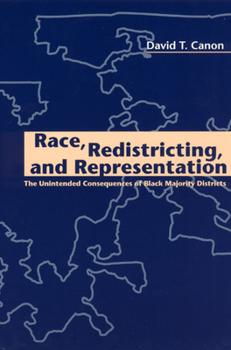Race, Redistricting, and Representation: The Unintended Consequences of Black Majority Districts
Select Format
Select Condition 
Book Overview
Since the creation of minority-dominated congressional districts eight years ago, the Supreme Court has condemned the move as akin to "political apartheid," while many African-American leaders argue that such districts are required for authentic representation. In the most comprehensive treatment of the subject to date, David Canon shows that the unintended consequences of black majority districts actually contradict the common wisdom that...
Format:Paperback
Language:English
ISBN:0226092712
ISBN13:9780226092713
Release Date:October 1999
Publisher:University of Chicago Press
Length:304 Pages
Weight:1.05 lbs.
Dimensions:0.7" x 6.0" x 9.1"
Customer Reviews
2 ratings
Predicting Representation Styles In Black Majority Districts
Published by Thriftbooks.com User , 18 years ago
In an attempt to predict the behavior of representatives as well as political outcomes in black majority districts, Canon develops the "supply-side theory." Canon writes, the "supply-side perspective examines the process of candidate emergence: how individual politicians respond to the electoral context imposed by new district lines, and in turn, their decisions shape electoral outcome in a given district" (93). According to Canon's theory, as black majority districts are created, a high number of black candidates will emerge. He further suggests that if only black candidates run, the winning black candidate will adhere to a "politics of commonality" approach to representation. If a white candidate is also in the field, the winning black candidate will adhere to a "politics of difference" approach to representation (94). In other words, in a black majority district, "the presence or absence of a white candidate will determine which type of black candidate wins" (96). In order to test the supply-side theory and explore the balancing approach to representation, Canon developed a methodology composed of both quantitative and qualitative methods; here termed a method of triangulation. From the qualitative school, Canon uses comparative case study analysis. Canon uses two case studies of black majority districts in North Carolina. In addition to case studies, Canon conducted a number of interviews with representatives and staffers. The qualitative method allows the author to concentrate on individual behaviors and motivations. The author argues that the use of case studies and interviews allows for the exploration of variables such as personal ambition, and other variables that motivate candidates to enter political races. In addition, Canon concludes that "members of Congress (from black majority districts) get elected by appealing to different electoral coalitions, and they stay in office by keeping those constituencies happy," in other words, by maintaining a balancing approach to representation (143). In order to support his hypothesis with quantitative evidence, Canon uses a data set that "includes the race of every candidate in House districts that were at least 30 percent black in 1972, 1982, and 1992" (96). This data set allows the author to test specific assumptions by controlling for different variables across districts. Furthermore, Canon offers a host of regression analyses covering many instances of race in politics in the House of Representatives. He uses Leadership Conference on Civil Rights scores, statistics of the Congressional Black Caucus (CBC), racial content of bills and legislative outcomes, and others. The research illustrates a number of important phenomena regarding the representation of black constituents by African-American legislators. First, in the early years of the CBC, black legislators maintained a politics of difference style of representation. However, after 1992, an influx of moderate black r
Excellent
Published by Thriftbooks.com User , 24 years ago
David Canon's account of race and representation is an excellent one. His eclectic research methodology engages the reader; personal interviews with congressmen and their staffers complement other, more traditional, analyses very well. In sum, majority-minority districts promote the "politics of commonality," moderating racism and fear on all sides. While Canon's philosophical "pleading" disappointed the previous reviewer, I found his candor quite refreshing. Rare is the scholar who admits personal bias. For a unique, well-argued, and persuasive study of racial politics, buy this book.





